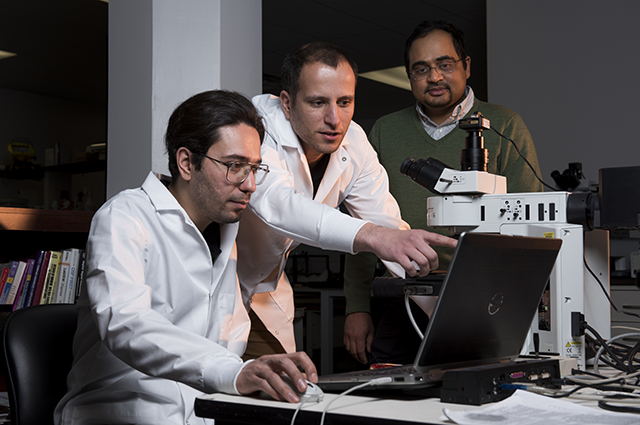Microsystems research awarded

Professor Sameer Sonkusale and collaborators from the Department of Electrical and Computer Engineering and the Department of Biomedical Engineering were recently recognized by the Nature journal Microsystems & Nanoengineering for research excellence. The team's paper titled "Low-cost and cleanroom-free fabrication of microneedles," published in the journal in 2018, was selected as an outstanding paper. Detailed in the paper, the researchers devised a method to produce microneedles — arrays of tiny needles that deliver medication through the skin without causing pain — without cleanrooms, using readily available materials and equipment. Authors from the Tufts Nano Lab were postdoctoral fellow Hojatollah Rezaei Nejad; PhD alumnus Aydin Sadeqi, EG20; MS alumnus Gita Kiaee, EG18; and Sonkusale.
The paper titled "A toolkit of thread-based microfluidics, sensors, and electronics for 3D tissue embedding for medical diagnostics," published in 2016, was selected as a highly cited paper of Microsystems & Nanoengineering. The research team reported on thread-based microfluidic networks that work with biological tissue in three dimensions, and demonstrated a suite of integrated physical and chemical sensors connected to electronic circuitry. The authors were PhD alumnus Pooria Mostafalu, EG15; Mohsen Akbari and Ali Khademhosseini of Harvard Medical School’s Biomaterials Innovation Research Center, the Harvard-MIT Division of Health Science and Technology, and Harvard University’s Wyss Institute for Biologically Inspired Engineering; PhD alumnus Kyle Alberti, EG15; Associate Professor Qiaobing Xu; and Sonkusale.
With a focus on micro-electro-mechanical systems (MEMS) and nanotechnology, Microsystems & Nanoengineering is the first engineering journal co-published by the Nature Publishing Group and the Institute of Electronics of Chinese Academy of Sciences. It publishes leading innovative research in microsystems and nanoengineering.
Department:
Biomedical Engineering